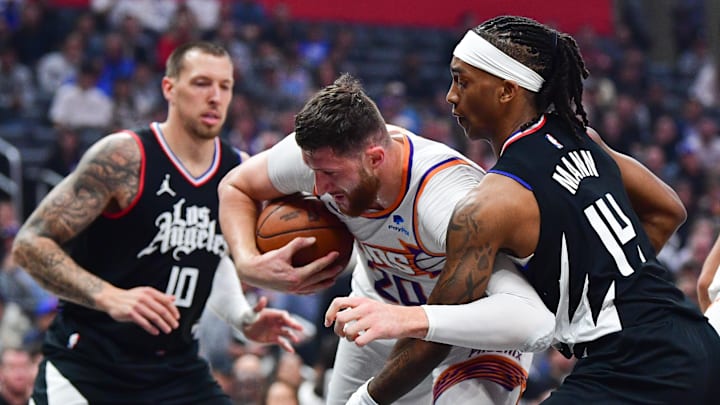When the Phoenix Suns traded for Jusuf Nurkić on the eve of the 2023-24 season, the front office justified the move by saying that they liked his fit around their new “Big 3”. With his unique combination of size and playmaking, the theory was that he could maximize their strengths and cover up some of the team's weaknesses.
They weren’t entirely wrong on that front, and Nurkić's season ended up highlighting the difference between value and production.
Nurk's box score stats were fairly ordinary as he averaged 10.9/11/4 on 55% TS. That scoring number was the lowest he’d registered in several years, while his assists and rebounds were among the highest he’s ever averaged.
The one number that leaps off the page is Nurkić’s net rating of 9.2, which was a top 10 mark in the entire league among players who logged as many minutes per game as he did. The only Sun who had a higher rating was Royce O’Neale, who played just 30 games with the team and was in a reserve role.
Both of their marks were far above anyone else on the roster, the next best being Devin Booker’s at 5.8. By that measure, it would seem Nurkić had an unbelievable season, but there is some context that dampens that sentiment a bit.
Reporter: “[Jusuf] Nurkic said after the game that he thought your antics tonight proved you didn’t learn anything.”
— ClutchPoints (@ClutchPoints) February 11, 2024
Draymond Green: “If he wants me to walk around quiet like him I’m never gonna do that. Quiet guys don’t win.” 🗣️
pic.twitter.com/jI9LbZkZK9
Due to the flaws of the Suns' roster, namely the lack of rebounding and playmaking, Nurkić became incredibly valuable to the team because he provided both. They really only looked competent when he was on the court, and when he sat those holes were glaring.
Nurk's value was made that much more apparent because his primary backup, Drew Eubanks, had a rough season and was unable to fill the unique role that Nurkić did. For that matter, there are few players in the entire league that can, which is hardly Eubanks's fault.
So while Nurkić was truly indispensable for the Suns, that value came mostly from the deficiencies of the roster.
Still, he had to play well enough for that value to show up on the court, which he did for the most part. Nurk had numerous massive rebounding efforts, including setting the franchise record for rebounds in a game, and his playmaking and IQ throughout the season made the lack of a point guard that much more palatable. He also played in 76 games, which made it his healthiest season in years and also led the team.
Nurkić wasn’t without flaws though, a lot of which have been constant throughout the years. His efficiency for a center is atrocious, which was highlighted by him converting only 60% of his looks in the restricted area. He was even less of a threat from everywhere else, shooting 48% in the rest of the paint, and only hitting 24% of his 3-point looks.
He also offered no resistance on defense, especially at the rim due to his lack of athleticism. Thankfully, those weaknesses weren’t exploited often in the regular season, but that was not the case in the playoffs.
Against the Minnesota Timberwolves, all of Nurkić’s flaws were exposed to the highest degree. He was constantly attacked on defense while also being unable to make the Wolves pay for ignoring him on offense.
Worse still, the things that he actually did well in the regular season did not show up in that series. His assists per game dropped to 2.8, as he predictably had the ball in his hands less. His rebounding also dropped to 8.3 per game against the giant Minnesota front court.
Nurk was far from alone in having a bad series, but the alarming part of his performance was how much of it was due to the built-in weaknesses in his game. Whereas the other Suns were just playing poorly, missing shots, or being guarded well, Nurk’s struggles against the Wolves was something much more fundamental.
It's why the Suns should probably look to move him this offseason and address their weaknesses in a way that doesn't compromise them by relying heavily on a flawed player. Nurkić deserves a ton of credit for the way he maximized his role during the regular season, but his postseason performance showed why that's not a great model for success.
